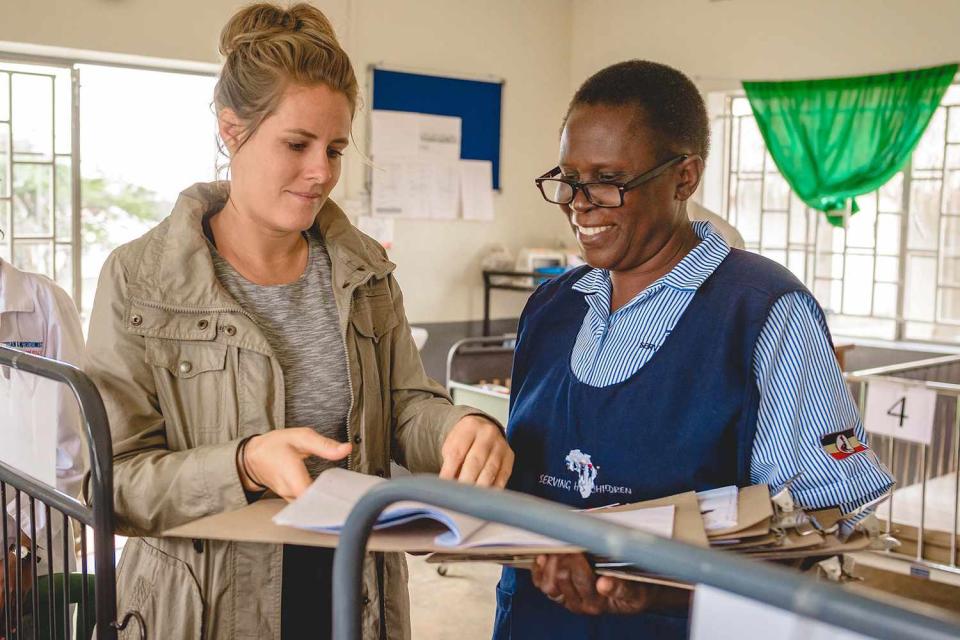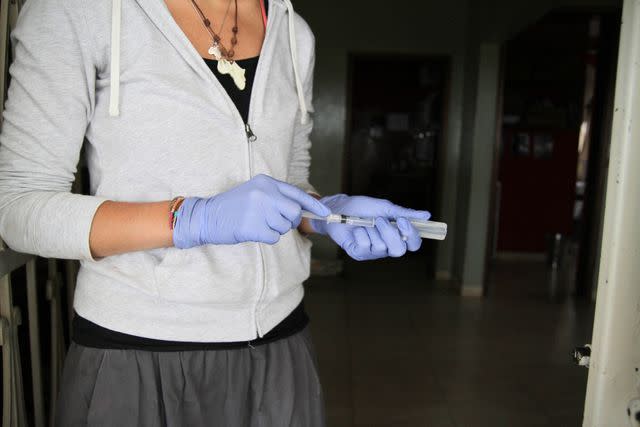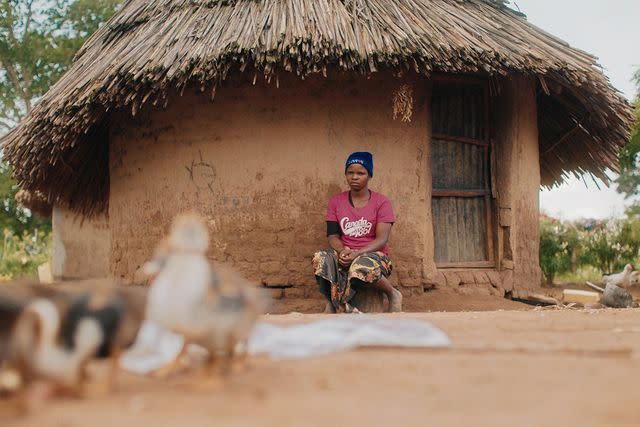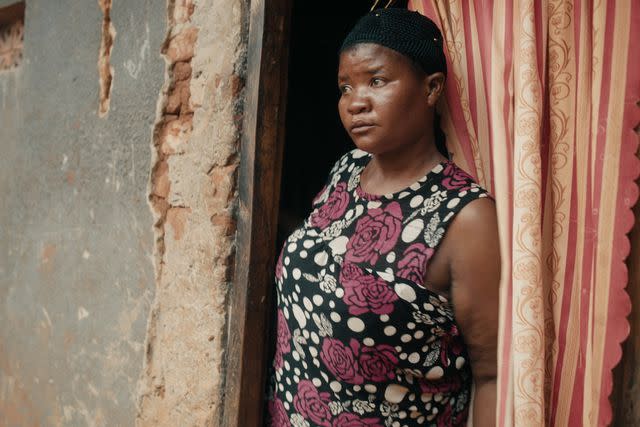Renee Bach's Uganda Missionary Work Scrutinized in Doc 'Savior Complex' After 105 Children Died
An American missionary thought God was telling her to treat Ugandan children with medical problems — but a nurse says she "got into a fantasy that she was ordained and special"

Marshall Foster/HBO
Renee Bach with Constance Alonyo, SHC’s head nurseRenee Bach felt she was “called by God” to save dying children in Uganda. Now her missionary work is being questioned in Savior Complex, the HBO docuseries streaming on Max.
“I feel like I’ve taken the hit for every single White person in Uganda,” the former Evangelical missionary, now 34, says in the doc. “I did not kill children.”
In total, 105 children died after being treated at Bach's Serving His Children facility in Jinga, Uganda, where she cared for 940 extremely sick children from 2010 to 2015, according to her 2020 interview with NPR. Their ailments included malaria, pneumonia and tuberculosis, the doc says.
At the time, local hospitals were short on cash and provided acute care, but they referred the children's long-term rehabilitation care to missionaries, according to Dr. Abner Tagoola, head of Jinja Children's Hospital.
"Like Renee, I want to make this a better place for children," Tagoola, who worked with Bach, says in the documentary. "But Renee is lucky because she is an American and communities are moved to fund. [We] had the training, but the money was coming directly to her."
While he initially referred people to Bach's clinic, he says she crossed lines when she began treating the children as if she was a medical professional.
"She thought that she can do as well as the Regional Referral Hospital," he told the filmmakers.

Courtesy of HBO
'Savior Complex' posterThe three-part docuseries — directed and produced by Jackie Jesko — starts with Bach's journey as a 19-year-old missionary. A home-schooled teenager from rural Virginia, Bach was inspired by her Baptist church to serve in Uganda and then set up a charity to help feed starving children.
Fueled by lucrative U.S. fundraisers that used ill children's stories and speeches at churches in the States, Bach started expanding her work from handing out food to providing medical care without formal medical training.
Jackie Kramlich, a fellow church missionary and an American nurse, volunteered at SHC alongside her husband Chris. In the doc, she recounts her horror at seeing Bach administer medical care she was not qualified to give: medical injections and IV drips, as well as second-guessing medical dosages.
“I think Renee got into a fantasy that she was ordained and special and set apart,” Kramlich says in the docuseries. "She [thought] she was just naturally a doctor."

Marshall Foster/HBO
Renee Bach prepares a syringe to administer medicine to a young patientMuch of the first two episodes features Bach’s perspective now and the ample footage of her time in Uganda. It's contrasted with insight from both Ugandan civil rights attorney Primah Kwagala, who brought a civil suit against Bach (which was ultimately settled), and No White Saviors, an organization that sought to shut Bach down and have her criminally prosecuted. (To date, Bach has not been criminally prosecuted.)
Led by Black Ugandan activist Olivia Alaso and self-described “White savior in recovery” Kelsey Nielsen, No White Saviors began an aggressive campaign against Bach and Serving His Children.
Related: All About Gwen Shamblin Lara, the Late Diet Guru and Religious Leader
"Are intentions good enough?" says Alaso in the documentary. "Africa is not your playground."
Tagoola believes Bach was driven by desperation to help the children. While he doesn't blame Bach for the fatalities because the children were so medically fragile, he doesn't condone her work.
"A child in America to die is a big deal. At this facility, we lose 60 a month. If you come with money, like Renee, it can save lives," Tagoola says in the doc. "We did not know it would escalate to this, that they would have their own ICU. I wasn’t comfortable. She overstepped."

Courtesy of HBO
Gimbo Zubeda brought her critically ill son Twalali to the clinicIt isn't until the third episode that viwers see the touching stories of the moms impacted by Bach. Two of the women were part of the 2019 civil suit Kwagala brought against Bach.
Gimbo Zubeda's son Twalali died shortly after coming to the hospital with severe malnutrition, according to the doc. The clinic tried to help him, but he "had multiple conditions" and succumbed shortly after arrival, the doc says.
Kakai Annet's son Elijah died at home after being seen at the clinic, according to the doc. He was never admitted because the nurse determined his primary condition was tuberculosis, not malnutrition.
Related: 'Playboy Mansion Baby' Struggled with Mom's Allegations Against Hugh Hefner: 'Very Complicated'
The mothers had wanted to know what had happened to their children while they were being treated at the clinic. According to the doc, they were satisfied with the answers given to them and the apology issued by Bach as part of the settlement reached in the lawsuit. They also received $9,480 each in their 2020 settlement with Bach, the doc says. Bach and her organization, Serving His Children, did not admit liability as part of the settlement.
"Justice means so many things to so many people," Kwagala says in the project. "For these women, they defined justice as Renee acknowledging who they were."

Courtesy of HBO
Kakai Annet sued Bach and Serving His Children after her son Elijah died at home after being seen at the clinicOne woman brought to Kwagala's attention by No White Survivors was a mother whose daughter had been highlighted in Bach's social media posts. The daughter, Patricia, had a bad reaction to a transfusion Bach was said to have performed. Instead of being part of the lawsuit against Bach, the mom praised her.
"Renee was so caring," the woman — identified only as Patricia's mom — says in the series. "She nursed the child’s wounds. They taught us the best way to feed our children. I benefited a lot."
Bach returned to her home in Bedford, Virginia, in 2019 with her Ugandan daughter, whom she adopted. (She did not return PEOPLE's request for comment on the docuseries.)

Marshall Foster/HBO
Photos of the children at Serving His ChildrenNot long after she left, fundraising stopped and SHC shut down. Bach reflects in the documentary on whether she was selfish or selfless.
"I do believe Serving His Children saved lives," Bach says. "I think from childhood God gave me the gift to help other people...I'm still sorting through it."
Savior Complex is now streaming on Max.
For more People news, make sure to sign up for our newsletter!
Read the original article on People.

 Yahoo News
Yahoo News 
